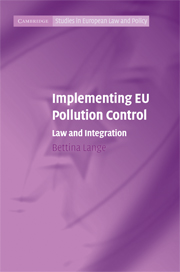Book contents
- Frontmatter
- Contents
- Series editors’ preface
- Acknowledgements
- Update on the IPPC Directive
- Abbreviations
- 1 Introduction
- 2 Traditional perspectives on the role of law in EU integration
- 3 Critical perspectives on the role of law in EU integration
- 4 What is EU ‘law in action’?
- 5 Talking interests – generating procedure: How political discourse constructs key aspects of BAT determinations in BREFs
- 6 Variation in open and closed BAT norms
- 7 What does it cost? Economic discourse in the determination of ‘the best available techniques’ under the IPPC directive
- 8 Does ‘law’ integrate? Licensing German and English coke ovens under the IPPC Directive
- 9 Conclusion
- Appendix: Methodology
- Bibliography
- Index
4 - What is EU ‘law in action’?
Published online by Cambridge University Press: 07 August 2009
- Frontmatter
- Contents
- Series editors’ preface
- Acknowledgements
- Update on the IPPC Directive
- Abbreviations
- 1 Introduction
- 2 Traditional perspectives on the role of law in EU integration
- 3 Critical perspectives on the role of law in EU integration
- 4 What is EU ‘law in action’?
- 5 Talking interests – generating procedure: How political discourse constructs key aspects of BAT determinations in BREFs
- 6 Variation in open and closed BAT norms
- 7 What does it cost? Economic discourse in the determination of ‘the best available techniques’ under the IPPC directive
- 8 Does ‘law’ integrate? Licensing German and English coke ovens under the IPPC Directive
- 9 Conclusion
- Appendix: Methodology
- Bibliography
- Index
Summary
Introduction
Chapters 2 and 3 discussed traditional and critical approaches to conceptualising law in EU integration. Chapter 3 argued that it is necessary to inquire more closely into the nature of law in the process of EU integration. This chapter therefore examines what sociological accounts of law can offer for understanding the nature of EU law. It focuses on a ‘law in action’ approach. This, in turn, draws attention to the points of intersection between a legal and a social sphere and how power relations mediate them. The chapter argues that discourse theory can shed new light on ‘law in action’, specifically how the key legal obligation under the IPPC Directive to use ‘the best available techniques’ is defined in practice. The first section of the chapter begins by defining the terms ‘social’ and ‘legal’. The second section explores different types of intersection between them. The final section analyses Michel Foucault's contribution to understanding power relations in ‘law in action’.
Points of intersection between ‘social’ and ‘legal’ worlds at the heart of ‘law in action’
What does ‘law in action’ mean? The term ‘in action’ draws attention to the ‘dynamic’ element of legal rules, to the ‘living law’ and allows us to explore how rules become ‘animated’ (Selznick, 2003:177; Ehrlich, 1936). In more positivist terms, ‘law in action’ refers to ‘the reality of law’ (Brigham and Harrington, 1989: 45). It also implies that normative orders are not just abstract constructs, but have an empirical basis.
Information
- Type
- Chapter
- Information
- Implementing EU Pollution ControlLaw and Integration, pp. 86 - 103Publisher: Cambridge University PressPrint publication year: 2008
